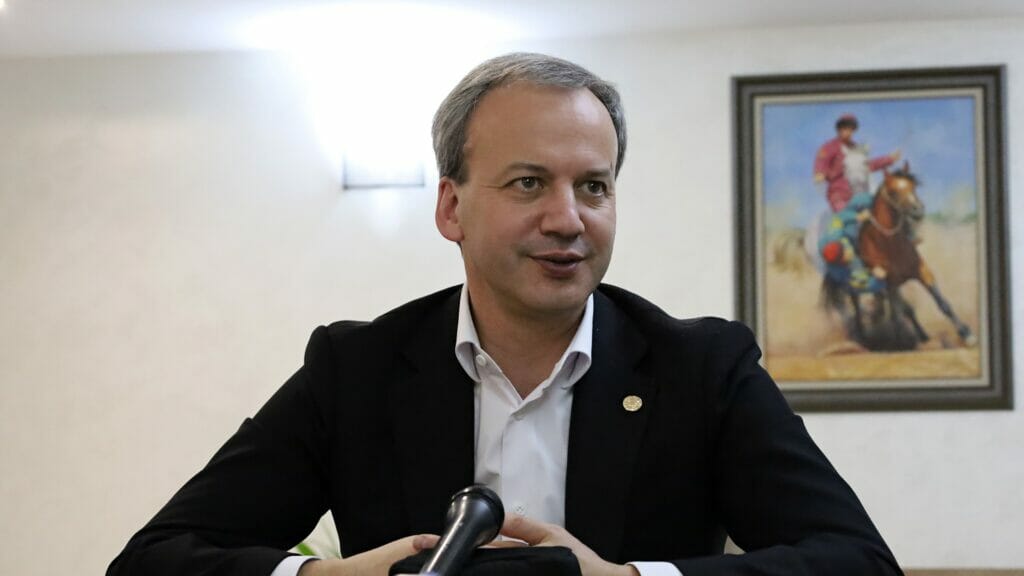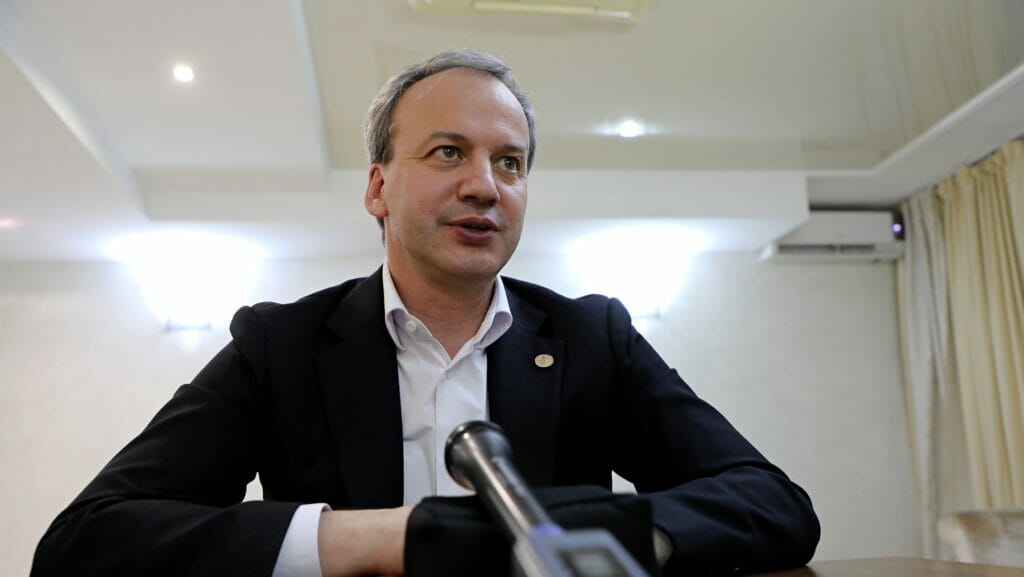Factors that drive chess market

This week Almaty hosted the FIDE World Rapid Chess Championship. President of the International Chess Federation Arkady Dvorkovich talked to Kursiv about key trends in the world of chess and the future of this sport during the raising geopolitical tensions.
— Mr. Dvorkovich, last year you said that people would rather play chess than watch the game. You also said that people prefer to play for free, which is why the chess market doesn’t grow. Has anything changed since then?
— Even though people prefer to play chess than just watch the game, the chess market has been growing. For example, Chess Olympiads in India have turned into a powerful booster for the sport in this country. Currently, India is the largest chess power in the world in terms of the total amount of active chess players and the number of young and talented sportsmen. Moreover, people in India love both playing chess and watching chess. Among other countries where the chess industry is doing well are the U.S. and some European countries. We have no data for China, but I believe there are no problems with chess in that country as well.
Despite all obstacles associated with the current geopolitical situation and the state of the global economy, we are still able to find partners and organize big tournaments. This means that partners are interested in chess. It is a signal that we are in a positive trend.
— There are two trends in the world of chess. First, this is the digitalization of the game, turning it into something like a cyber sport, the rapid development of gaming platforms and mobile apps like Play Magnus. Second, it seems that rapid has overshadowed classical chess. How do these trends change the perception of the game?
— Indeed. Today we’ve seen these trends become more obvious and significant, although they aren’t new. For example, after chess.com acquired Play Magnus Group, an umbrella brand for several labels including the chess24 game platform, they announced a rapid tournament with a prize fund of $2 million. I think this is a bright confirmation of the trend.
The new generation prefers watching a fast game with commentators, a splash of emotions and clear timing for games when wins and losses just come and go. People like using online platforms and streaming services, but does it mean that classical chess is getting less popular, as Magnus Carlsen said? I don’t think so, even though I am not going to argue with Magnus because he is inside of the game and may know something that I don’t know. However, in my opinion, there is no risk for classical chess. People all over the world play slow chess and love the game. So, I think that the development of rapid, cyber sport and digital chess is just one more parallel trend.
— What do you think about chess intelligence? Is the work with chess players any different from work with regular people, let’s say from an anthropology point of view?
— As Magnus Carlsen said at the press conference in Almaty, those who are good at chess, including himself, are just regular people who are good at chess. I mean, it would be naive to think that the talent to play chess might be easily transformed into real-life skills. Of course, chess intelligence can positively influence general intelligence, but they aren’t the same. Chess teaches us how to make strategic decisions, respect our opponent and follow the rules of the game, all while improving memory (at least in amateur sports). But chess can’t and won’t replace real life. This is just a good game for getting pleasure and training your intelligence.
— Nassim Taleb wrote in his book Fooled by Randomness that many of those who apply for the position of trader mention achievements in chess in their C.V…
— No doubt, chess helps better understand many things like a variety of solutions, to feel the entire chessboard or game field. However, it is wrong to treat real people like figures on a chessboard. Although in martial arts, basketball and football – I know that for sure from coaches and players – chess might improve a team’s strategy.
— The Queen’s Move series has pushed the popularity of chess sky-high. However, the popularity of the series itself was based on two key factors. First, it’s a vivid reference to the feminist agenda. Second, the series have actively exploited the common image of a chess player as a half freak, half genius, something like Dr. Gregory House. Does FIDE somehow work on the image of its leading players, Magnus Carlsen, for example? How does the system of chess stars work?
— Yes, there are several superstars like Magnus and others. But many years ago we had Fisher and others or Kasparov and others. You always have someone as a superstar – a world champion. Mikhail Tal was a superstar until he was defeated by Mikhail Botvinnik. I mean there are just a few superstars in the world of chess. Here in Almaty, we saw Hikaru Nakamura receive a special level of welcome from the audience. He is a star, a hero of streaming and he got all the applause from the audience during his match.
Magnus is also incredible. There is no need to build a special image for chess stars. They are all individuals. But of course, we need them to talk to people, to act as public figures and not to focus only on the game. Chess tends to immerse players in the special world of the game, and we need them to be more open to the public because it is necessary to make chess more popular to attract new partners. This is a key point. I don’t think that their image is that important; they decide on their own how they are going to appear before the audience.
— Do you promote the conversation between chess stars and the audience?
— We have contracts with all chess players that implies they have some public duties. Currently, players do understand how it is important because they see how a conversation with the media can influence the market and make more partners want to support us. As a result, we can organize high-profile tournaments. I mean, they are ready to attend different events and play with children, for example.
— I have a slightly private question. Do you have more freedom in FIDE compared to the years of your service in the Russian government?
— Yes, I have more freedom. There are fewer limitations in the federation from a legal point of view. However, the total scope of work is the same. Let’s say that there is more freedom, but no spare time.
— What was the state of FIDE before you came to the office? What do you think about the role of Ilyumzhinov?
— I think that Kirsan Ilyumzhinov has done a lot for chess. At some point, he even saved FIDE from total collapse. He saved the chess calendar to keep going with world championships and other tournaments. The absence of a system approach, lack of qualified staff, and no marketing and promotion for chess were the main characteristics of FIDE before Ilyumzhinov joined the organization. Many things were done for free, because of true love for the game. People in the FIDE, including Ilyumzhinov, had spent their hearts and souls on this work, although the lack of a system approach was still there. When I came, my team and I tried to replace enthusiasm with professionalism and I can now say that it is paying dividends. We’ve stabilized the work of the organization, attracted many new partners and successfully negotiated with the largest online platforms.
— Is it possible to promote the sport when the world is so divided? How often do you see cancel culture because of the Russian invasion of Ukraine?
— We are doing everything we can to make sure chess players can play chess. We do not want politics to separate chess players from the sport. I think we are doing quite well, even though we still have some exceptions. Today FIDE is one of the few places where everyone is welcome. Of course, we have some restrictions associated with flags and other symbols, but we welcome everyone. We are one big chess family and this is very important.
— Kazakhstan is a good example of a country that welcomes everyone. Is it possible for Russian chess players to participate in tournaments in Europe?
— Yes, if we talk about official tournaments organized by FIDE, because we choose the locations where everyone can attend. This is a rule. If a host country can’t meet this rule, we have to switch to another option. However, the European Chess Union has different rules. They do not allow those under the Russian flag to participate in their events. In FIDE we have no such rule, which means that we can’t hold official tournaments in some countries.
— What do you think about Kazakhstan’s potential in chess?
— In Kazakhstan, we see significant progress in chess, first of all among women. There are many high-professional chess players and young amateurs. Male chess players are not so successful yet, but we can see some promising players three or five years from now. There is a chance that chess will be taught in Kazakhstani schools. I know that President Tokayev has already supported the idea. If it happens, it will be a huge boost for chess in the long run. Big international tournaments are a good tool to spark more interest in the game.
— What is the outlook for the chess market in Asia? Many Russians are going to play there…
— The Chess Federation of Russia has applied for joining the Asian Chess Federation. I don’t know whether this application will be accepted or not. Of course, Russians are seeking opportunities to play in Asia because they can’t play in Europe. Moreover, don’t forget about India, China, Uzbekistan, Iran, Turkey and women chess players in Kazakhstan. All these countries have well-developed chess markets. I mean Russian chess players can find strong opponents there to improve their playing skills.
As a result, the Asian Chess Federation will grow stronger, and competition in the world of chess will become more intense. This is obvious. Some countries may be pushed back by newcomers (Russian chess players), so those who make the final decision should think twice.

The 2022 FIDE World Rapid Championship in Almaty started on December 25 and will last until December 30. The prize fund of the championship is one million dollars. The chess event has been organized by FIDE and the Chess Federation of Kazakhstan. The Almaty city administration and the Ministry of Culture and Sports also supported the tournament.
The general partner of the event is Freedom Broker, which provided the entire prize fund. Among other partners are Lancaster Group, Shokan Ualikhanov School, Chess Legends, Tioline and Turan (a mineral water producer), Coca-Cola, the National Welfare Fund Samruk-Kazyna and Qory (the Tourism and Sports Industry Support Fund).
On December 29, President Kassym-Jomart Tokaeyv sent his congratulations to Dinara Saduakassova, who won second place at the FIDE rapid championship in Almaty. «We are proud of our chess players. The success of our fellow citizens at international tournaments is a vivid confirmation of the high professional level of our domestic school of chess,» the president said.

